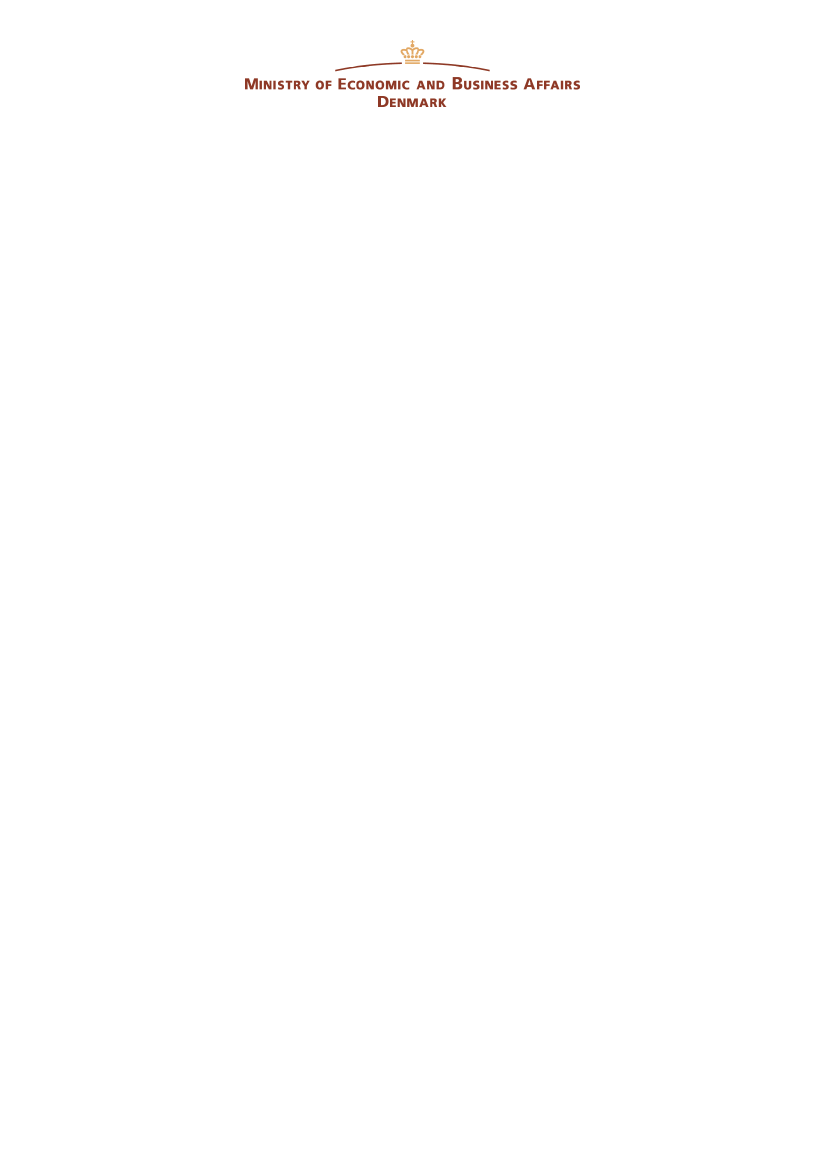Erhvervsudvalget 2009-10
ERU Alm.del Bilag 211
Offentligt
NOTE
Response from the Danish Government to the public consultation on
the review of the European Standardisation System
The Danish Government generally supports a review and evaluation ofthe existing European standardisation system since there could be a needfor updating and adapting the legal framework and the standardisationprocess in light of new demands and opportunities in a globalised worldwith comprehensive technological developments. A service check of thestandardisation system is also in line with the initiatives envisaged by theCommission in relation to the Commission’s EU2020 Strategy, whichaims at creating framework conditions and provide a basis for futuregrowth and employment in Europe. In addition, it is the government'sposition that standardisation could be an important tool in implementingpublic policy and avoiding barriers to trade in a global world. In a possi-ble revision of the European standardisation system, it is crucial to main-tain the national delegation principle, improve the efficiency of the Euro-pean standardisation organisations, and to ensure an open and transparentstandardisation system in which all stakeholders, including consumers,have the opportunity to participate in the standardisation process.Standardisation could furthermore be an important tool in cases whereEU-regulations (in shape of e.g. new approach directives) should be filledout with more detailed specifications. However, in line with decision2008/768/EC the application of the new approach – and thereby stan-dardisation – can be waived in order to ensure adequate consumer protec-tion, public health and the environment or other aspects of public inter-ests where it is more appropriate to set out the essential and detailed re-quirements in the Community harmonisation legislation concerned. Dueto earlier experiences with the use of the new approach in the area of en-vironment it is important that the environmental objectives and require-ments are determined in a political process.Q1: Do you think that service standards (including process standards)and alternative standardisation documents should be included in thescope of Directive 98/34/EC or its successor?In order to ensure the free movement, service standards should be in-cluded in the scope of Directive 98/34/EC or its successor. Standardisa-tion could be an important policy instrument to support the developmentof an internal market for services. As for alternative standardisation doc-2/5
uments, however, there might be obstructive difficulties in establishingnotification requirements followed by a standstill procedure.Q2: Are you aware of specific cases where national service standardsand alternative standardisation documents have caused technical bar-riers to trade?National standards can have a counter-competitive effect in service sec-tors operating on a global market, e.g. maritime services. Hence, stan-dards in sectors operating on a global market should be international/global in order to establish fair competition as well as similar costs forbusinesses across borders and regions.On behalf of the Danish Enterprise and Construction Authority, Techno-polis (a British consultancy company) is currently carrying out an analy-sis and preparing a report on the state of affairs regarding standardisationin services in selected countries. The report is due in June 2010. Whenthe results are published, the conclusions may provide further importantinformation, e.g. regarding barriers for service standardisation.Q3: For areas other than Information and Communication Technology(ICT), should it be possible to refer to documents developed by fora andconsortia in legislation and public policies? If it should, how should it beimplemented?Direct reference to documents that are not implemented in the EuropeanStandards Organizations (ESOs) should not be pursued, in particular notfor areas outside the ICT area. The strength of the European Standardisa-tion System is the coherence and cohesion of the system and the opennessto all stakeholders according to the WTO principles. Documents devel-oped by fora and consortia should when necessary be implemented by theESOs, and hence not referred to independently as documents with specif-ic status of their own. However, more emphasis on cooperation betweenthe ESOs and fora and consortia could be pursued, given that the viewsand interests of all stakeholders, including consumers, are taken into ac-count.Q4: How could ESOs and NSOs be encouraged to accelerate their stan-dards development process? Should for example the Community financ-ing for standardisation be subject to conditions in terms of speed of deli-very whilst maintaining the openness of the process?Speed of delivery is of great importance. ESOs and NSOs should conti-nuously be encouraged to develop and improve their working methods,tools and processes in accordance with the needs expressed by stakehold-ers, e.g. through professional support to technical committees and in-creased use of ICT opportunities. It is, however, important to balancespeed against transparency, consensus and quality.
3/5
Furthermore, it is of great importance to ensure that the Commission’smandates to ESOs are precise and sufficiently specific, in particular withregards to environmental specifications in NLF-directives. Speed of deli-very should be monitored and benchmarked in order to provide and dis-tribute best practices across standardisation committees and sectors.Q6: Should the WTO principles of transparency, openness, impartiality,consensus, efficiency, relevance and consistency be integrated in the le-gal framework of European Standardisation (especially in EU Directive98/34/EC or in its successor)? How should this be implemented?The WTO principles may be integrated in the legal framework. If theprinciples are integrated, specific rights for stakeholders to participateshould be emphasized and explicated further.Q7 (1): How could the participation of consumer organisations, envi-ronmental NGOs, trade unions and social partners, and SMEs be bestpromoted? What should be the role of public authorities (EuropeanCommission and Member States) in supporting such a participation in atransparent, open, impartial, consensual, efficient, relevant and consis-tent European standardisation system?National (mirror) committees provide the best platform for the participa-tion of stakeholders with limited resources. The role of national publicauthorities should first of all be to support the stakeholders with limitedresources, so that they can participate in the standardisation processes.Furthermore, national public authorities should when relevant participatedirectly in the European standardisation process. In countries in whichnational stakeholder participation is low, it may be necessary to assureand support further stakeholder involvement at the European level.Q7 (2): How should NSOs (National Standards Organisations) deepentheir cooperation, and mutualise their activities? Could the followingtasks be shared amongst several NSOs?1. Management of the Secretariats of Technical Committees?2. Notification of new national standardisation projects?3. Promotion/sales of standards?4. Other?The NSOs already cooperate and share knowledge and best practices.More systematic use of benchmark studies may enhance the dissemina-tion of best practices, but at the same time it is important to notice thatthe NSOs are adapted to their local markets and conditions.Q8: Without prejudice to the national delegation principle, how could theEuropean Standards Organisations (ESOs) manage directly, on a case bycase basis, some standardisation activities, especially some TechnicalCommittees?
4/5
That should be for the ESOs to decide and manage.Q9: What support should the European Commission provide to facilitatethe use of European standards as a means to open global markets? Whatwould be the operational means that the Commission should use? (Sup-port experts’ participation in international standardisation activities,translation of European standards into extra-community languages?)The Commission should promote standardisation as a common policytool in international trade negotiations and agreements, and through regu-latory dialogue with third countries, e.g. in the TEC (Transatlantic Eco-nomic Council). Furthermore, the Commission has an important task inensuring global implementation of international standards.Q10: Under which conditions do you think the European Commissioncould launch, on a case by case basis, calls for tenders, open to the ESOsand to other organisations, to develop standards supporting EU policiesand legislations?This is not a sustainable method. The European standardisation system iscoherent due to the fact that initiatives are handled in one coordinatedsystem. It is of utmost importance to ensure an open and transparent stan-dardisation process and to ensure the participation of all stakeholders,including consumers.Q11: What is, in your view, the most efficient level of participation in theprocess of standards development: national, European, international?All three levels of standardisation have their advantages: Nationalstandardisation is relevant for specific and local needs and forcoordinating positions and input for the European and international levelwhile European standardisation provides support for EU legislation andhelps to reach the goals of the Single Market, i.e. free movement of goodsand services etc. Finally, international standardisation enables a commonunderstanding at global level, which could be implemented into regionaland local standardisation, and thereby limit the number of nationaldeviations at the global market place.Q12: In your opinion, where is the major added value in European stan-dardisation with respect to national standardisation?The major added value in European standardisation with respect tonational standardisation is to help eliminate barriers to trade within theinternal market.Q13: What are, in your view, the most serious barriers to the use of stan-dards by enterprises: costs of standards (purchasing price)? Costs ofoperational implementation? Access to information? Knowledge of exist-ing standards?
5/5
In general there is not sufficient knowledge about the possible economicgains that the application of standards can provide for the specific com-pany (especially in SMEs).Furthermore, the costs of updating and implementing the standards areburdensome, in particular for SMEs. Businesses, in particular SMEs,must have access to standards at a reasonable price and, if necessaryaccess to assistance in order to understand them and implement them cor-rectly. Standardisation organizations could provide further knowledge toSMEs, i.e. through clear communication, e.g. easy-to-read handbooks,guidelines, etc.Q14: What could the standards organizations do, in addition to their cur-rent practice, to facilitate the access to standards, especially by SMEs?See answer to Q13.





